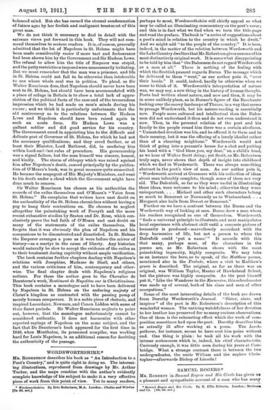WORD SWORTHSHIRE.*
MR. ROBERTSON describes his book as "An Introduction to a Poet's Country," and is quite right in doing so. The interest- ing illustrations, reproduced from drawings by Mr. Arthur Tucker, and the maps combine with the author's evidently complete knowledge of his subject to make it a very effective piece of work from this point of view. Yet to many readers, rha• Wordswerthehire. By Eric Robertson, S.A. London : Chatto and Wirelna ad. net.) perhaps to most, Wordsworthshire will chiefly appeal as what may be called an illuminating commentary on the poet's verse ; and this is in fact what we find when we turn the title-page and read the preface. The book is " a series of suggestions about a poet's mind in relation to the country in which he dwelt." And we might add " to the people of the country." It is here, indeed, in the matter of the relation between Wordsworth and the Lake Country dwellers that Mr.Robertson gives us so m e of his most distinctively original work. It is somewhat disappointing to be told by him that" the Dalesmen do not regard Wordsworth as a man at all." There is nothing of the feeling with which the Scottish peasant regards Burns. The message which he delivered to them "went," as our author puts it, "over their heads." It could, indeed, hardly be otherwise when we come to think of it. Wordsworth's interpretation of nature was, we may say, a new thing in the history of human thought. Poets had written about nature, and now and then, it may be in some unlikely place, as in Horace's figure of the Bacchante looking over the snowy landscape of Thrace, in a way that seems to presage Wordsworth, but his nature-reading is essentially new. People more cultured and intellectual than the Dales- men did not understand it then and do not even understand it now. Then, in the personal relation of the poet and his family to the people round him there was a certain aloofness.. " Unmatched devotion was his, and he offered it to them and to their country, but it was the offering of a lonely idealist rather than of a cheering neighbour." Wordsworth would not think of going into a peasant's house for a chat and putting his hand with a " God bless you, my dear," on a child's head, as we hear of Walter Scott doing ; yet Scott, as Mr. Robertson truly says, never shows that depth of insight into childhood which we find in Wordsworth. There was always something abstract in the poet's view of men. As our author puts it, " Wordsworth arrived at Grasmere with his collection of ideas about man tolerably complete, though some of them not very old. The Dalesfolk, so far as they were useful in illustrating these ideas, were welcome to his mind ; otherwise they were unimportant. . . . Michael and other such characters belong as much to Somerset or Normandy as to Westmorland. . . Margaret also hails from Dorset or Somerset."
Further on we have a contrast between the Burns and the Wordsworth way of looking at men. Burns drew a man whom his readers recognized as one of themselves. Wordsworth " finds a universal principle to illustrate, and next manipulates local experience with abstract skill until a concrete picture of humanity is produced—marvellonsly accordant with the deep harmonies of life, but not a person to whom the Dalesfolk could 'put a name." It accords with this that many, perhaps most, of the characters in the poems are, as Mr. Robertson shows with the most painstaking ingenuity, highly composite. We may take as an instance the hero, so to speak, of the Matthew poems, mentioned also in the Prelude, where a visit to Matthew's grave is described. The original, as far as there was an original, was William Taylor, Master of Hawkshead School, but the picture was highly composite. As the poet himself put it, " Like the Wanderer in the Excursion., this schoolmaster was made up of several, both of his class and men of other occupations."
Some of the most interesting details of the book are drawn from Dorothy Wordsworth's Journal. " Sister, slave, and inspirer" of the poet is Mr. Robertson's description of this wonderful woman. The untiring watchfulness of her devotion to her brother has preserved for us many curious observations: One of them is the exhausting effect which the work of com- position sometimes had upon the poet. Dorothy describes him as actually ill after working at a poem. The Leech- gatherer, for instance, seems to have cost him pains without end. One thing is plain : he took all his work with the intense seriousness which is, indeed, his chief characteristic. Curiously enough, it was little seen during his years at Cam- bridge. What a strange contrast there is between the two undergraduates, the uncle William and the nephew Chris- topher—afterwards Bishop of Lincoln !


































 Previous page
Previous page